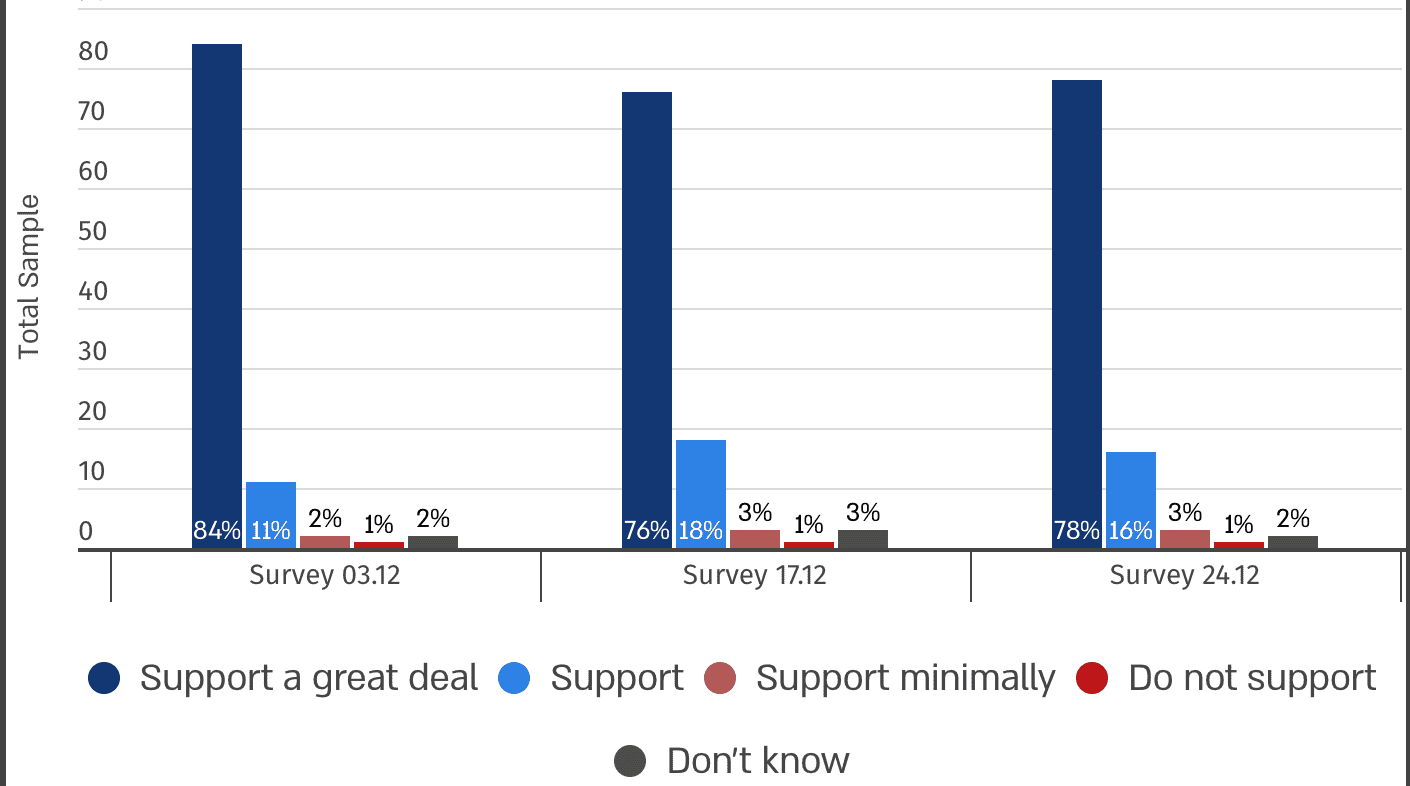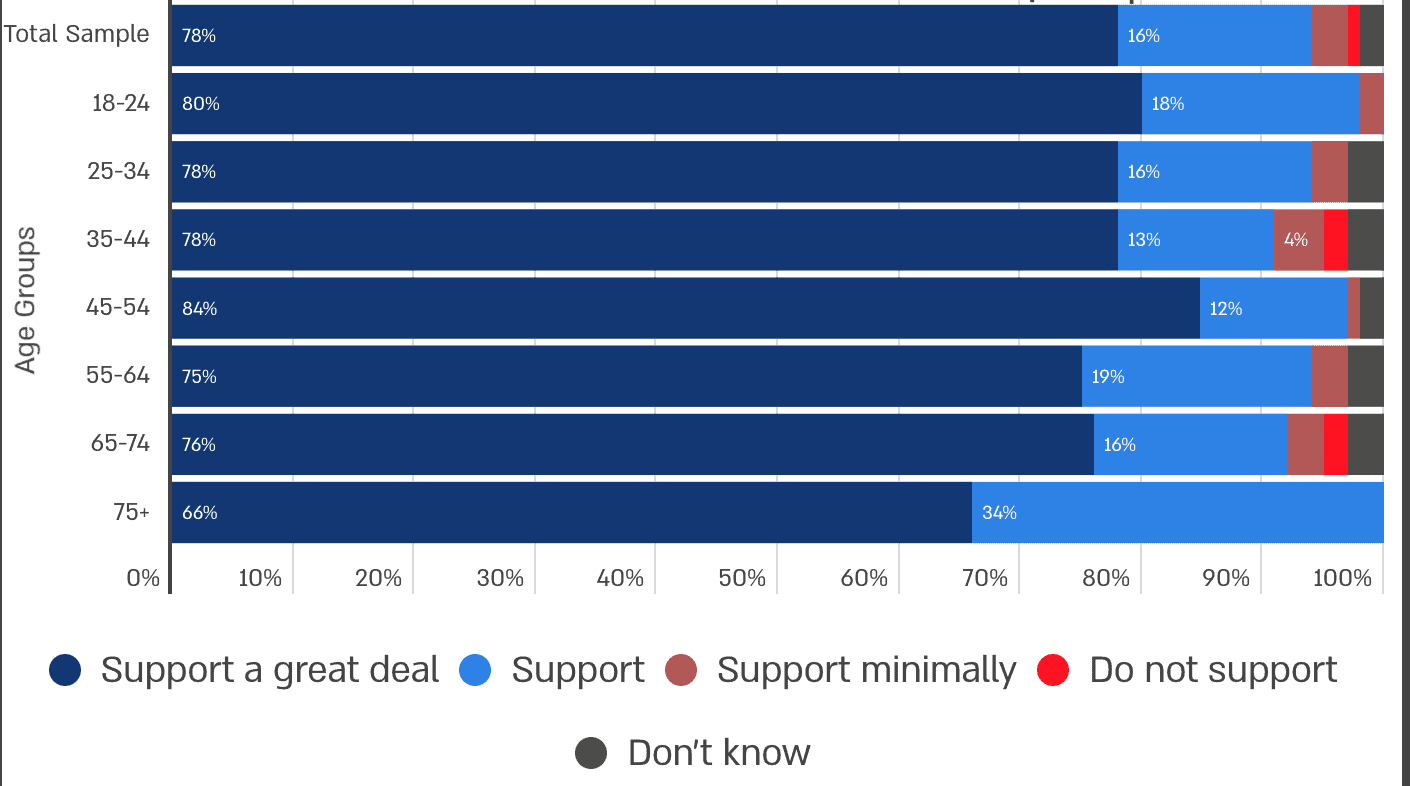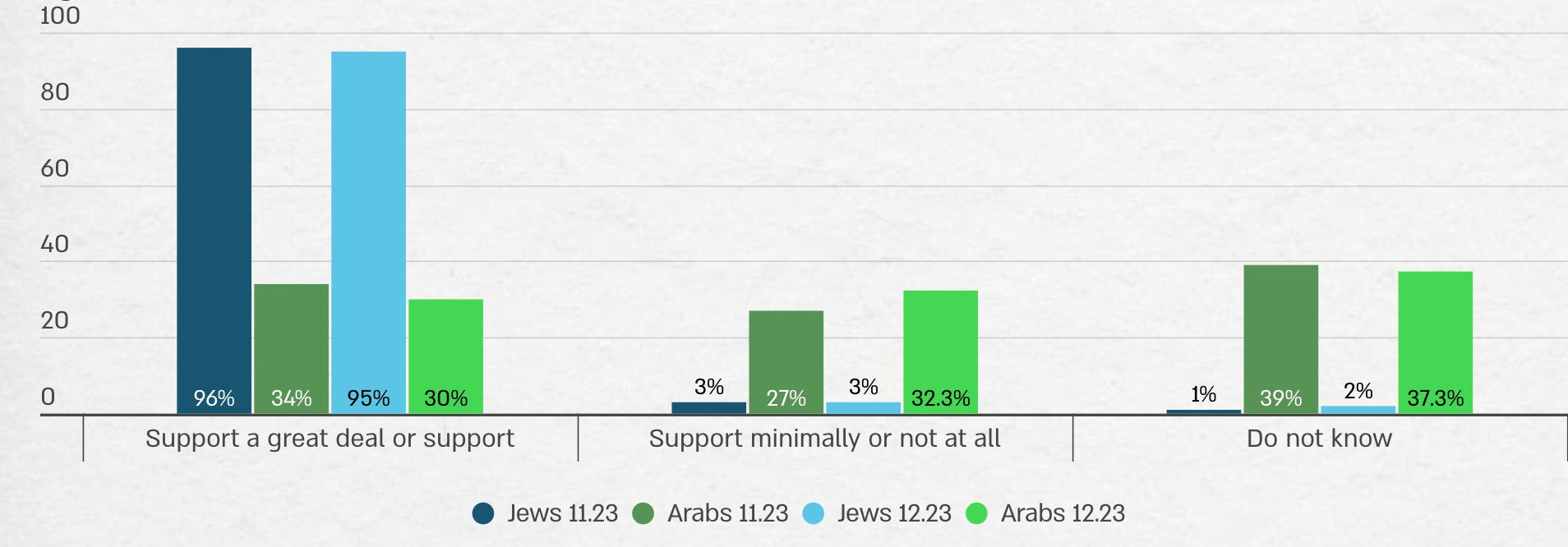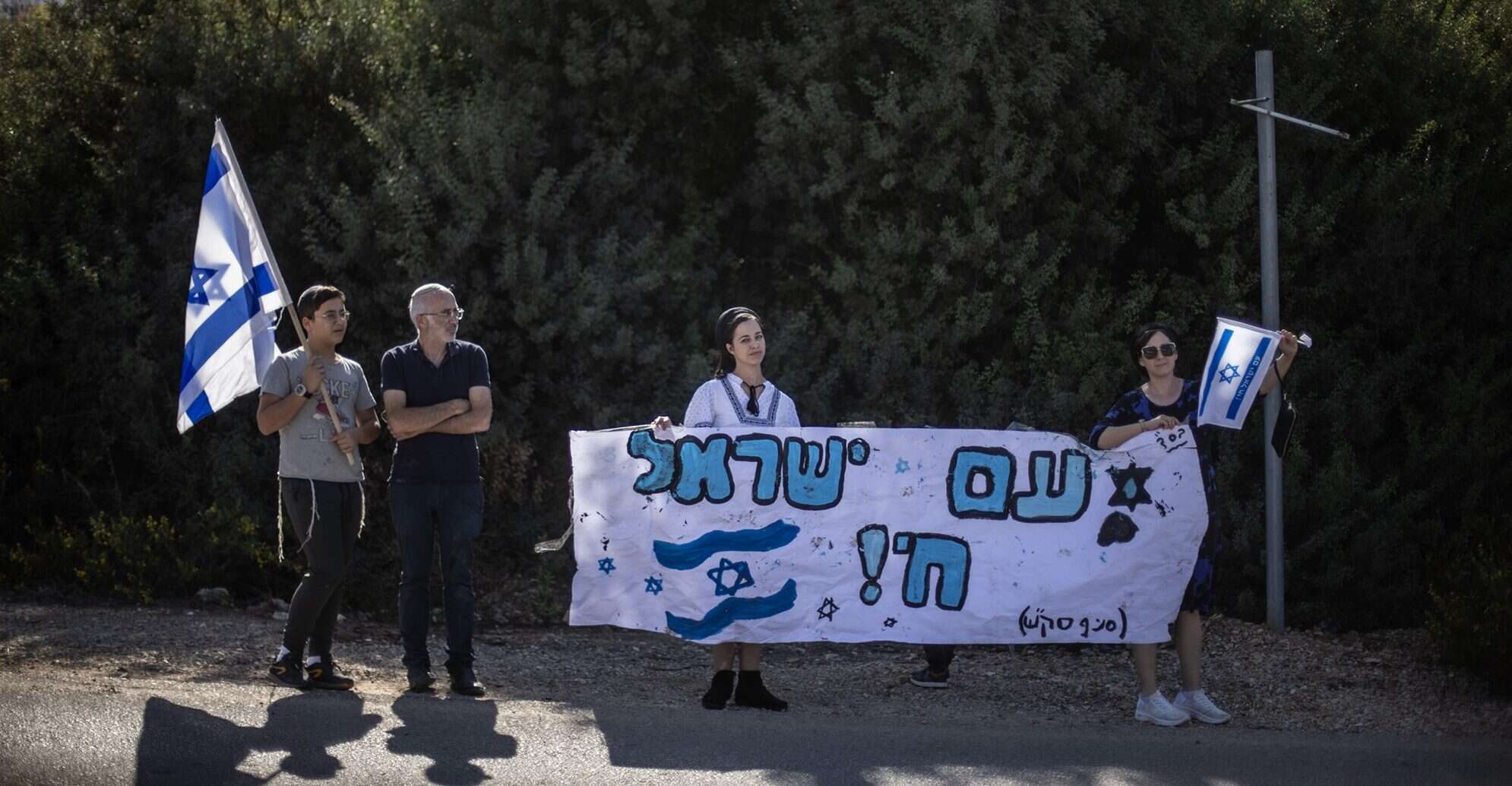Publications
INSS Insight No. 1809, January 10, 2024
Weekly surveys conducted by the Data Analytics Desk at the Institute for National Security Studies (INSS) since the outbreak of the Gaza war have examined, inter alia, the degree of public support in Israel for the goals of the war. Findings can help assess the extent of internal solidarity within Israeli society regarding the war with Hamas, and in turn, the extent of national resilience. The findings show that thus far there is a steady and extremely high level of support for the goals of the war, headed by toppling the Hamas rule in Gaza. This support is also evident with the breakdown of various segments of Jewish Israeli society, including among a variety of political and religious views. This support likely stems from the collective trauma that Israelis experienced on October 7 and cemented the prevalent view that the war is not only just, but also necessary and inevitable. At the same time, there is no guarantee that this level of support will continue indefinitely, especially if the war becomes more complex, if it expands, or if it persists for an extended period in any form. Even now, the Israeli public has begun to ask questions about some of the more sensitive issues related to the war. In tandem, a polarizing and toxic public and governmental discourse seeks to take center stage, undermining national resilience.
The goals of Israel’s war against Hamas, as presented by the government to the public in multiple formats, are toppling the terrorist organization’s rule in the Gaza Strip, destroying its military and governmental capabilities, lifting the threat of terror that Gaza has posed to Israel for years, and releasing the hostages. The level of public support for these goals could be an important indication of the level of solidarity among the Israeli public. This issue has been examined through weekly surveys conducted since the start of the war by the Data Analytics Desk at the Institute for National Security Studies (INSS), in conjunction with the Rafi Smith Institute.[1]
What follows are key findings in response to one specific question: “Israel’s political echelon determined that a goal of this war is to topple Hamas’s rule in the Gaza Strip. To what extent do you support this goal?”
Overall sample findings appear in Figure 1.

Broad Support over Time
In these three surveys conducted over the course of December 2023, there is a clear trend of staunch support from the Jewish Israeli public for the goals of the war, with around 84 percent expressing a great deal of support on December 3, around 76 percent on December 17, and around 78 percent on December 24 (Figure 1). Presumably this reflects a desire or need on the part of respondents to express their sense of solidarity with the war effort and the IDF, especially following the atrocities committed by Hamas on October 7. Similar results appeared in two consecutive surveys conducted by Shaul Kimchi et al., which examined the level of Israeli national resilience during the war, including the issue of “affiliation to the state”/“patriotism.” These latter surveys found that on a scale of 1 to 6, Israel’s national resilience index stood at 4.93 in the first survey (conducted October 11-15). and 4.96 in the second survey (November 10-15).
Political Leaning and Support:
Israelis who self-identify as right wing or moderately right wing show the highest level of support for the goals of the war – some 85 percent “support a great deal,” according to the December 24 survey, compared to 76 percent of respondents who identify as the center. Fewer among the left “support a great deal,” with support from the moderate left at 53 percent and from the left at 43 percent. Among respondents who identify with the left, who comprised just 10 percent of the sample, there was an unusually high level – around 38 percent – who declined to express an opinion (Figure 2).

Secular and Religious
An analysis of the responses in the December 24 survey based on religious affiliation and background provides an interesting picture. While 78 percent of respondents expressed a great deal of support for the war’s goals, the level of such strong support among secular Israelis was around 74 percent, while among those who identified as religious or traditional the high level of support stood at 79 percent and 81 percent, respectively. Among those respondents who identify as ultra-Orthodox, the level who expressed “a great deal of support” was the highest, at around 91 percent (Figure 3).

Age
An analysis of age distribution shows that the highest level of support comes from Israelis between 45 and 55, with “a great deal of support” for the goals of the war among 84 percent. Behind this group were the 18-24 age group, at around 80 percent. The oldest age group – 75+ – showed the lowest level, at around 66 percent (though only 5 percent of the sample were in this category.

Jews and Arabs
Two additional INSS surveys[2] analyzing the Jewish-Arab relationship (Figure 5) found that 30 and 34 percent of the Israeli Arab respondents in November and December, respectively, reported that they support to some degree the Israeli goal of toppling the Hamas’s rule. Given the circumstances of the war, this is a relatively high level of support. Around one third of respondents answered “don’t know”: presumably for some this response reflected a natural and predictable preference not to support the goals of the war publicly, given the sensitive nature of the issue. If so, then the level of support may actually be higher.

Conclusions
- The findings of the surveys relate to the overall set of goals of the war in a single question, without addressing the elements of the government decision (which were not published) and which were phrased vaguely. Examining the connection between the goals of the war and national resilience during wartime requires in-depth research and can only be done once the war is over. For the time being, the level of broad support for the war is extremely high and stable.
- An extremely high level of support for the goals of the war reflects a clear sense within the Jewish Israeli public of a shared purpose, which fits in with the patriotism and social solidarity in the context of the war. Societal solidarity is one of the key elements of national resilience. To date, most social segments of the Jewish Israeli public strongly support the war, which they view as a just, defensive war that was forced upon Israel.
- The war, widely regarded as a historic and unprecedented event, erupted at a time of profound social and political polarization in Israel, manifesting itself in several months of active and challenging divisions on many fronts. This posed a severe threat to the nation’s societal unity. Against this backdrop, the strong support expressed by the Jewish public for the goals of the war and for the IDF represents a sharp change, whereby the population is rallying round the flag and the national war effort.
- The widespread support for the goals of war encompasses groups in society that hold different and sometimes opposing political and social views. An analysis of the data according to religious affiliation may indicate certain differences in the level of “a great deal of support” (91 to 74 percent), but all are close to the high national average of 78 percent of the total Jewish sample. The more religious the respondents, the higher the level of “a great deal of support” expressed for the goals of the war.
- The same is true concerning political affiliation, where there are differences between groups with different political leanings: the more the respondents define themselves as on the right, the higher their level of support for the goals of the war. The gap between the left and the right on this issue is around 42 percent. This gap is far wider than the difference between various Jewish religious groups, which stands at around 17 percent. Thus, it appears that political polarization is greater than religious polarization.
- Among Israeli Arabs, nearly one third expressed support for the goals of the war. Although there is no data regarding their level of opposition to these goals, a relatively substantial proportion accept the Israeli war goals, despite the massive destruction it is wreaking on their fellow Palestinians.
- Public support, as shown in the INSS surveys, is linked to the horrific events of October 7 and the ongoing collective trauma they have generated, leading Israeli Jews to perceive this war as just, necessary, and inevitable. Other surveys among Israeli Jews indicate that there is also an extremely high and stable level of trust in the IDF (around 90 percent) – a phenomenon that corresponds well with the widespread support for the war’s goals – while there is a consistently low level of trust in the government (around 28 percent).
- The findings regarding the variables that make up national resilience may change as the war goes on – certainly if Israel becomes more embroiled in the war, and if the fighting expands and drags on for an extended period, in various forms and on several fronts. At this moment, there are doubts and reservations expressed by some in the Israeli public about certain relevant and sensitive aspects of the operations, such as the obstacles preventing the release of the hostages, a perceived foot-dragging of the ground war, the situation on the northern front, and the question of “the day after” in the Gaza Strip. In addition, the polarized and toxic discourse that existed before the war has resumed. Each of these variables, and certainly a combination of them, could lead to a reduction in support for the goals of the war and cause a decline in the Jewish Israeli sense of solidarity regarding the war.
_________________
[1] The surveys were conducted on the internet among a representative sample of the Jewish Israeli adult public (age 18 and over) of 500 men and women.
[2] INSS surveys conducted with the Rafi Smith Institute on November 16-19 and December 14-17, with a representative sample of Israeli and Arab adults (800 men and women, age 18 and over)



